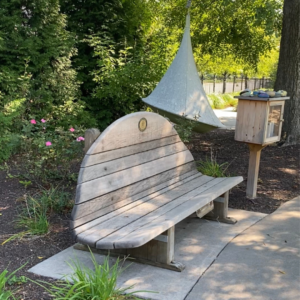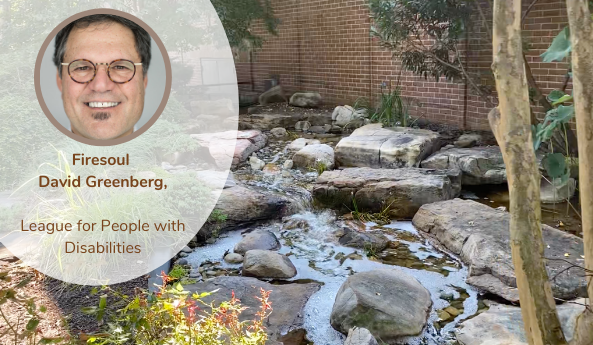It was one of those gorgeous early fall days that I sat down with Firesoul David Greenberg, President and CEO of the League for People with Disabilities in Baltimore, to talk about his Sacred Place. Sunlight, streaming through trees dappled us; birds chattered – and the nearby water moving swiftly over river rocks created the most soothing cloak of sound.
It was hard, then, in this setting, to conjure a vision of the buttons David described staff wearing at work to express their initial anger over plans to create this nature space: “F**k the garden.” At the time, the League, which provides a wide range of programming and services aimed at improving the lives of people with chronic disease or disability, was grappling with very real and dire needs for renovations. Think widening of doorways and hallways to accommodate wheelchairs — a garden, to many, seemed like a luxury that shouldn’t be prioritized. But that was more than 15 years ago. Today, that sentiment among staff and those who rely on the League, is a distant memory.
“We couldn’t operate as we do today without our Sacred Place,” said David.
Like every Sacred Place, the League’s includes a path. Uniquely tailored and designed to the people who use this space most, its width and paving make it easily navigable by those using wheelchairs to enter, explore and experience the garden alone, if they choose. Independently.
 During my visit, David took me on a walking tour of the garden as well as the rest of the facility. We were stopped briefly by a woman named Stephanie who had overheard David sharing stories of the League’s impact on participants. “I’ve been here for 20 years, and I love everything about the center; we all love the garden,” she shared.
During my visit, David took me on a walking tour of the garden as well as the rest of the facility. We were stopped briefly by a woman named Stephanie who had overheard David sharing stories of the League’s impact on participants. “I’ve been here for 20 years, and I love everything about the center; we all love the garden,” she shared.
David points out that they have more square footage outside than they do inside the facility that sits in a busy pocket of Northeast Baltimore. Their Sacred Place is woven into programming; yoga and art classes happen here; it was once even briefly transformed into a zoo. Well, almost.
“We had a zoo come out and we had a crowd gather in the garden; we got to see, up close, an armadillo, a flying squirrel, snakes — it’s just wonderful to have all of this outdoor space so that experiences like this are possible.”
The garden also serves as a place for staff to decompress — for League program participants to enjoy a moment of respite, independently, in nature. Or to sink their fingers into dirt, that is within their reach thanks to raised garden beds, and cultivate squash and tomatoes.
“I’ve watched people roll their wheelchairs off the path onto the grass to stop and just tilt their chairs back — faces toward the sky, soaking up the sun,” shared David.
Not far from where we are sitting is a collection of cheerfully painted stones bearing names — “Ricky,’ “Billy,” “Susan G.”
“One of our staff — more amazingly connected with participants than others — she just breathes what we do — she took it upon herself to help organize a memorial garden as people in our medical day program passed away,” said David. “She created a beautiful space in the garden, marking it with a piece of slate on which she’d written “remembering our medical day friends.” It’s here the memorial stones are placed — a remembrance of the people who once enjoyed this space, and evidence of nature’s silent impact on us all in times of happiness and sorrow.
— Angela Walseng, Nature Sacred Communications Strategist

